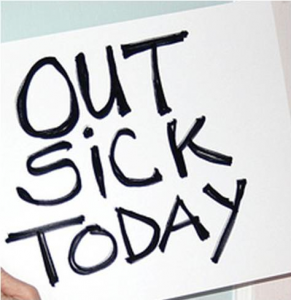Here’s a riddle: What does a leader do when she’s sick?
(Wait for the answer.)
First, consider our options: We can ignore our illness and align ourselves with the traditional, cultural way: to continue—or try to continue–to produce through our un-well condition. We often know the risks of this, but do it anyway. In this culture, to listen to our bodies’ signals for rest and healing – and to possibly stop working – might feel akin to blasphemy.
Another option is just not to feel, at all. This is deeper than ignoring. We just turn off receiving our sensations and carry on. Risks increase, but we are at least in motion.
Or, we can fall apart, disappear into our illness. Not the most common response, but a form of excess some of us might have experimented with at one time or another.
Another possibility exists, one from the perspective of enough, and it’s also the answer to the riddle: When a leader is sick, she is just sick. And, she is accountable for being sick.
Having just recovered from yet another bout of cold/flu, I noticed the symptoms of my mind, how my mental faculties deteriorated and took my mood with them. I even heard an internal dialogue that threatened my competence, my very value. In my state of un-well, I had dropped the threads of my work and I became quite disoriented. “What am I doing?” turned into “I’m not good at doing this.” A mood state can extend into the past rewriting history and creating the future, especially when our mind is mushy, so I even heard: “I was never good at this, and I never will be.” Yikes!
How easily we can lose touch with our value. I was just sick, and I forgot what my contribution was.
How do we take care of ourselves when we are sick while also being leaders — taking care of our colleagues, our clients and our organization? How do we do this with grace and mutual generosity?
Here are some key skills vital to being a leader under the weather:
- Tell my stakeholders I’m not feeling well, and keep them updated. Everyone’s stakeholders are different, but we start with our colleagues and anyone who is impacted by our workflow.
- Ask for help. This is perhaps the most difficult skill, in our hyper-independent culture. But it really helps everyone to know what might be missing while we are taking time to recover and how to handle that gap with grace.
- Just be sick. Take care of myself. Drink fluids. Take Vitamin C. Call your healthcare provider. Eat chicken soup. Call your mother.
- Engage in some way, if you can. This can feel counter to the main point here, but it’s meant to point to staying in connection – with yourself and your team. When I was last sick, I joined our weekly staff call and listened and rested at the same time. This can be helpful for the next skill.
- Ease back in mindfully. It does no one any good to jump back to work prematurely or too vigorously and risk a relapse. If we’ve been connected to our work in some way while we are taking the space to get well, easing in can be, well, easy.
- Be aware of your inner conversation. Cruel insults might not be everyone’s inner dialogue as a result of being sick, but most of us get disorientated. Ask: what comes up for me when I am sick? What associations do I have with illness? What does it mean to me to be sick? Keep the answer in mind to help you sort out what’s real and what’s your sickness talking.
- Keep track and get support for your own personal pitfalls when sick. These last two are perhaps the most radical skills, but point to a rigor in our leadership. Could being sick offer insight into who we are as leaders? How do we handle ourselves and others when there are unexpected, unwelcome interruptions in the plan?
